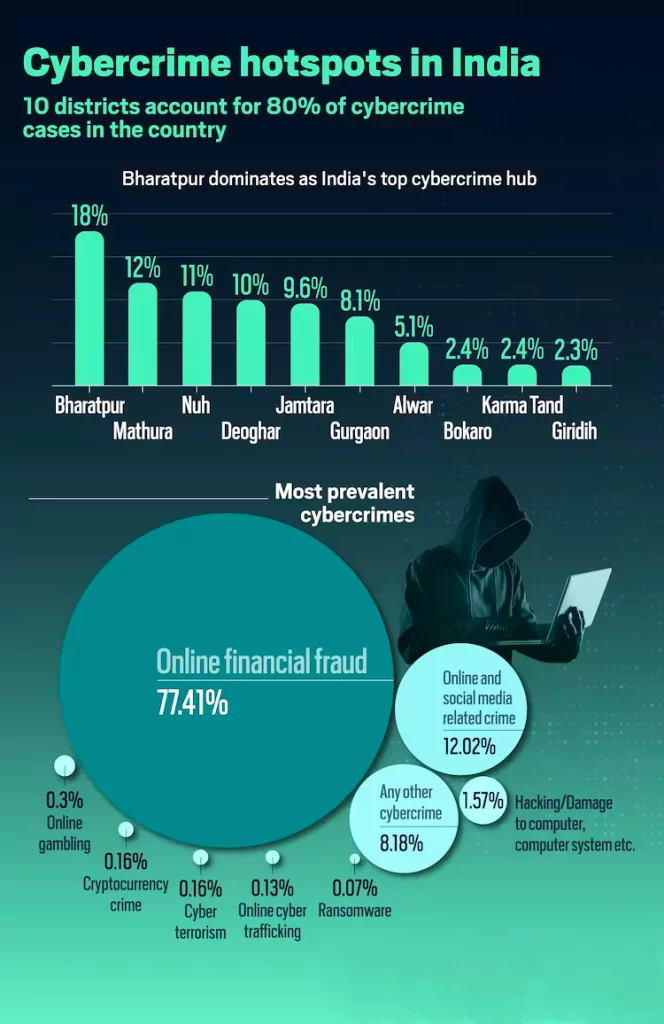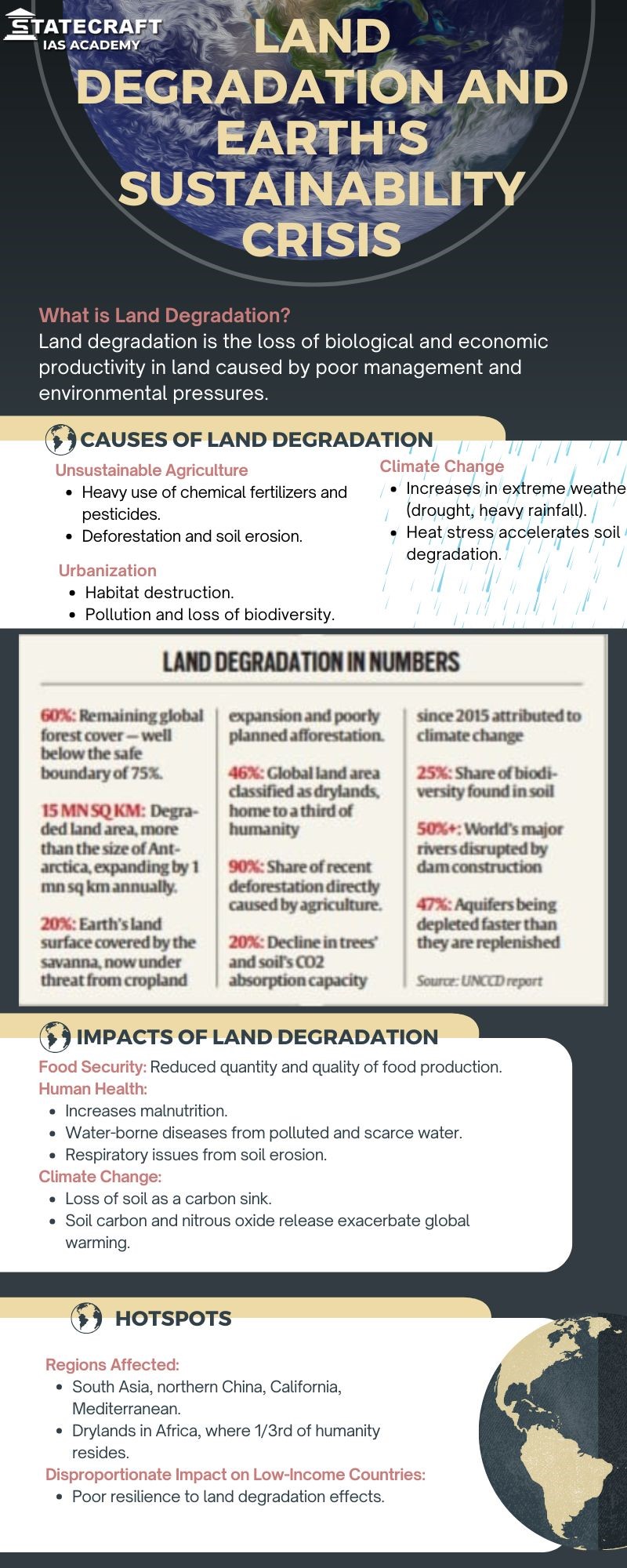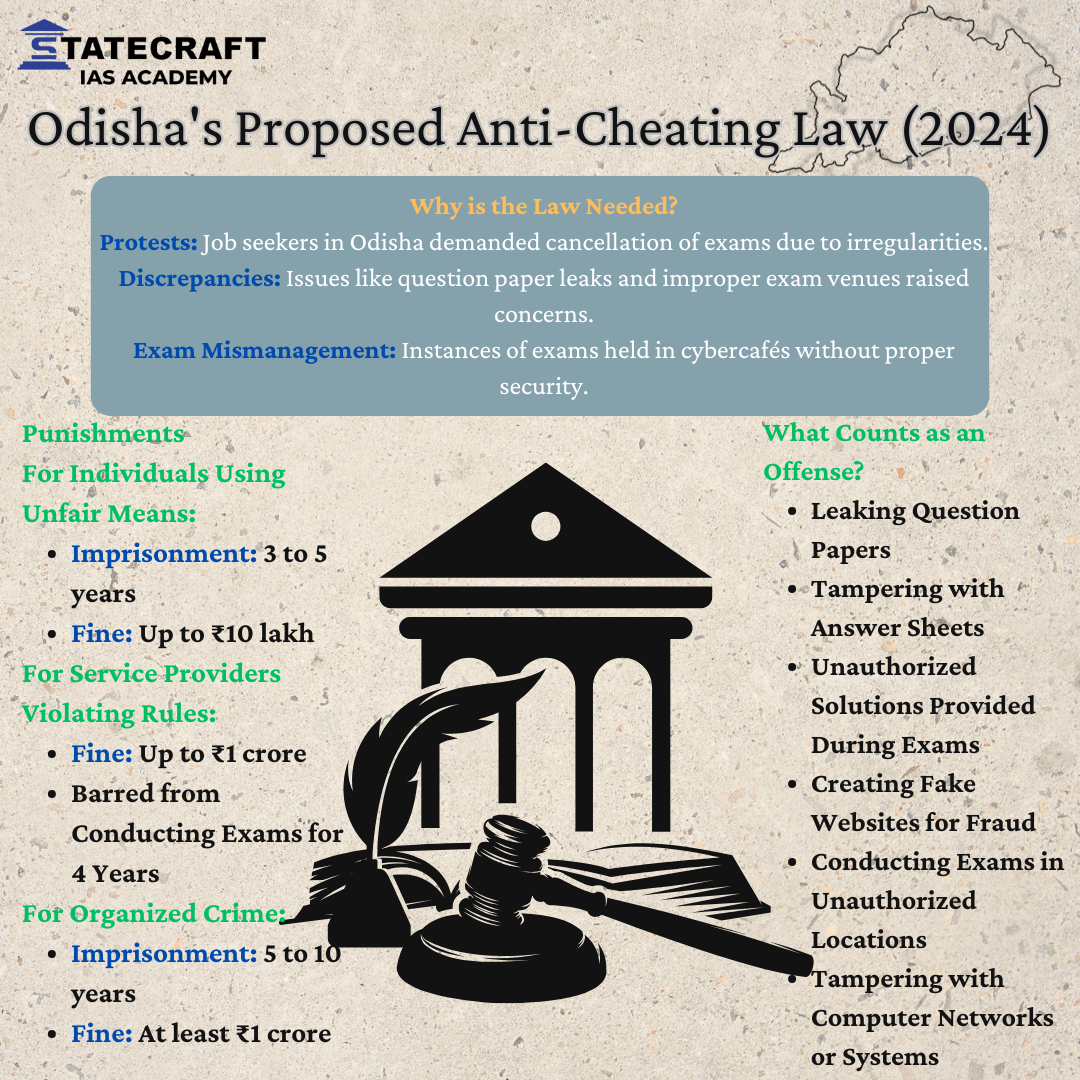Index:
- Parliaments Winter Session
- PRAGATI infrastructure monitoring system
- Government scrapped 30-month old windfall tax
- Russian President Vladimir Putin visit to India
- Growing menace of cybercrime in India
- Economic Growth Slowdown - Flowchart
- Land Degradation and Earth's Sustainability Crisis - Infographic
- Odisha's Proposed Anti-Cheating Law (2024) - Infopic
1. Parliaments Winter Session
Question Hour:
- Definition: The first hour of every parliamentary sitting is slotted for the Question Hour. However, in 2014 the Question Hour was shifted in the Rajya Sabha from 11 am to 12 noon.
- During this one hour, Members of Parliament (MPs) ask questions to ministers and hold them accountable for the functioning of their ministries.
- The questions can also be asked to the private members (MPs who are not ministers). Regulation: It is regulated according to parliamentary rules.
- The presiding officers of the both Houses (Rajya Sabha and Lok Sabha) are the final authority with respect to the conduct of Question Hour.
Kinds of Questions: There are three types of questions asked.
- Starred question (distinguished by an asterisk) – this requires an oral answer and hence supplementary questions can follow.
- Unstarred question- this requires a written answer and hence, supplementary questions cannot follow.
Short notice question is one that is asked by giving a notice of less than ten days. It is answered orally.
- Frequency: Question Hour in both Houses is held on all days of the session. But there are two days when an exception is made.
- When the President addresses MPs from both Houses.
- The President’s speech takes place at the beginning of a new Lok Sabha and on the first day of a new Parliament year.
- On the day the Finance Minister presents the Budget.
Zero Hour:
- Zero Hour is an Indian parliamentary innovation. It is not mentioned in the parliamentary rules book.
- Under this, MPs can raise matters without any prior notice.
- The zero hour starts immediately after the question hour and lasts until the agenda for the day (i.e. regular business of the House) is taken up.
In other words, the time gap between the question hour and the agenda is known as zero hour.
2. PRAGATI infrastructure monitoring system
CONTEXT: A study by Oxford University’s Saïd Business School has lauded Prime Minister Narendra Modi’s PRAGATI infrastructure monitoring system for accelerating 340 projects worth $205 billion across the country and bringing about economic transformation.
- The study looked at factors including close monitoring of infrastructure projects and their completion since 2015 through the PRAGATI system, an acronym for Pro-Active Governance and Timely Implementation of projects.
- “The platform symbolises India’s commitment to overcoming bureaucratic inertia and fostering a Team India mindset and culture of accountability and efficiency,” says the report.
- “PRAGATI has brought together diverse stakeholders from Central and State governments onto a single platform and this collaborative approach has been instrumental in addressing some of the complex challenges in infrastructure development, from land acquisition to inter-ministerial coordination,” the report says.
- The report adds that the economic impact of PRAGATI is evident. According to studies by the Reserve Bank of India and the National Institute of Public Finance and Policy, for every rupee spent on infrastructure, India sees a gain of *2.5 to 3.5 in GDP.
- “By fast-tracking projects that provide services like roads, railways, water, and electricity, PRAGATI has improved the quality of life for millions of Indians. It has incorporated sustainability into its core operations, facilitated faster environmental clearances and promoted the use of green technologies. This holistic approach ensures that India’s development is both inclusive and sustainable,” the report says.
PRAGATI (Pro-Active Governance And Timely Implementation), as the name suggests, is aimed at starting a culture of Pro-Active Governance and Timely Implementation.
- It is also a robust system for bringing e-transparency and e-accountability with real- time presence and exchange among the key stakeholders.
- The platform was launched on March 25,
- It is a three-tier system (PMO, Union Government Secretaries, and Chief Secretaries of the States)
- Prime Minister will hold a monthly programme where he will interact with the Government of India Secretaries, and Chief Secretaries through Video-conferencing enabled by data and geo-informatics visuals.
The programme will be held once in every month on Fourth Wednesday at 3.30 PM-to be known as PRAGATI Day.
3. Government scrapped 30-month old windfall tax
CONTEXT: The government scrapped 30-month old windfall tax on domestically-produced crude oil and export of jet fuel (ATF), diesel and petrol following a decline in international oil prices.
- Minister of State for Finance Pankaj Chaudhary tabled a notification in Rajya Sabha scrapping the levy on crude oil produced by firms like State-owned Oil and Natural Gas Corporation (ONGC) and exports of fuels done by companies like Reliance Industries.
- The notification rescinded the June 30, 2022 order and withdrew levy of special additional excise duty on crude oil (which is refined into fuels like petrol and diesel) and export of aviation turbine fuel (ATF), diesel and petrol, he said.
- Alongside, the road and infrastructure cess on petrol and diesel exports has been withdrawn.
- India first imposed windfall profit taxes on July 1, 2022 joining nations that tax super normal profits of energy companies.
A Windfall Tax is a type of tax that is levied on companies or individuals who have unexpectedly and/or dramatically gained large profits, often due to external factors beyond their control.
It is commonly levied on industries such as oil, gas, and mining.
The purpose is to capture a portion of the extraordinary profits that companies make and redistribute it for public good.
It is a strategic measure to promote transparency and fairness and responsible economic practices in the energy industry.
4. Russian President Vladimir Putin visit to India
CONTEXT: In a sign of closer engagement between India and Russia, Prime Minister Narendra Modi has invited Russian President Vladimir Putin to India for a summit early next year.
The dates are yet to be decided for Mr. Putin’s first visit to India since the Russian invasion of Ukraine in February 2022.
The announcement comes weeks after External Affairs Minister S. Jaishankar met Russian Deputy Prime Minister Denis Manturov in India for an inter-governmental meeting, and days ahead of a visit by Defence Minister Rajnath Singh to Russia this weekend, indicating that preparatory talks for the visit are under way.
Mr. Putin’s visit is expected to take forward the new “economic road map” for 2030 that the leaders have agreed to in terms of doubling bilateral trade to $100 billion and having more trade routes, including the recently operationalised Chennai-Vladivostok maritime trade corridor to provide fresh supplies to Russia’s far east.
They will also continue talks on the purchase of discounted crude oil imports from Russia, which rose to nearly $60 billion last year.
5. Growing menace of cybercrime in India
CONTEXT: At the Conference of Director Generals of Police last weekend, Prime Minister Narendra Modi addressed the growing menace of cybercrime in India, particularly digital frauds and non-consensual intimate deepfakes.
- Unlike traditional crimes like petty theft, organised digital frauds are not merely the work of financially desperate individuals; they represent a new class of criminals equipped with a variety of tools.
- Vulnerable telecom infrastructure – ill-prepared for the overwhelming volume of calls and messages from malicious fraudsters creates fertile ground for cybercrime.
- These criminals also employ ingenious techniques that constantly stay a step ahead of underprepared law enforcement and security systems.
- Cyber fraudsters constantly evolve their methods and adopt new personas to deceive unsuspecting victims.
- Alerting the public-repeatedly, creatively, and patiently – that they are at risk of losing money to fraudsters is an essential policy intervention. A little healthy scepticism could prevent many people from falling prey to scams.
- As the government pushes for universal banking and greater access to digital services, it is critical that these advances do not become vulnerabilities for ordinary people.
The issue of non-consensual intimate imagery is also pressing. With advances in artificial intelligence, criminals can now use deepfake technology to place ordinary individuals’ faces into pornographic content, causing great harm.
6. Economic Growth Slowdown - Flowchart
Key Points:
- Economic Growth Slowdown:
- Q2 GDP growth for 2023-24 dropped to 5.4%, lower than projections of 6.5%-7%.
- Weak urban demand, sluggish GST revenue, and declining consumer sales are contributing factors.
- RBI Challenges:
- Inflation at 6.2% and high interest rates limit growth policy options.
- Focus on inflation control, but limited room for rate cuts.
- Future Expectations:
- Rural demand recovery and capital expenditure ramp-up may help.
Concerns about urban consumption, wage increases, and inflation remain critical.






